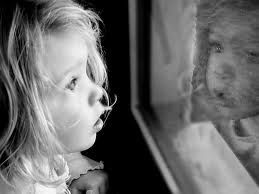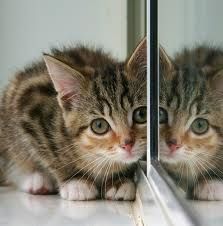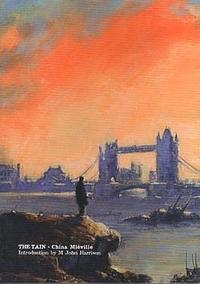Take a photo of a barcode or cover
¿Qué pasa si el elegido entiende mal para que lo eligieron?
Me he llevado una buena primera impresión de China Miéville, ¡este relato me ha encantado! Lo único malo es su corta extensión.
En un Londres apocalíptico, luego de la invasión de los Imagos, Sholl descubre que es el único humano al que los enemigos temen (o no desean) tocar y tiene la certeza de que ha sido escogido para hablar con el comandante invasor: el Pez del Espejos.
Al mismo tiempo, tenemos partes relatadas por un pachogo, un miembro de la fauna de los espejos, que nos cuenta la historia de opresión de su pueblo y su posterior rebelión.
"Pensaba que mi luz era parte de una constelación, y en un lento viraje he visto apagarse las otras estrellas hasta quedarme solo en el universo, y tengo miedo."
La historia me resulto muy adictiva, contada de una manera muy fluida y sin embargo, hubo momentos en que tanta información me resulto pesada. No fue hasta que termine de leer qué comprendí la razón, hay una falta casi absoluta de diálogos, solo leemos la mente de Sholl y del otro personaje sin nombre, pero no sabemos nada sobre los otros humanos o los enemigos. Los dialogo se reproduce en los pensamientos de nuestro narrador.
La trama parece inconclusa y me parece que podría haber dado para una novela extensa. Quedaron muchas cosas por aclarar y el final me supo a poco. Tal vez fue la idea del autor que terminara así, pero yo odio los finales tan abiertos... Y por eso no voy a darle una puntuación más alta, aunque a mi parecer se la merece.
Me he llevado una buena primera impresión de China Miéville, ¡este relato me ha encantado! Lo único malo es su corta extensión.
En un Londres apocalíptico, luego de la invasión de los Imagos, Sholl descubre que es el único humano al que los enemigos temen (o no desean) tocar y tiene la certeza de que ha sido escogido para hablar con el comandante invasor: el Pez del Espejos.
Al mismo tiempo, tenemos partes relatadas por un pachogo, un miembro de la fauna de los espejos, que nos cuenta la historia de opresión de su pueblo y su posterior rebelión.
"Pensaba que mi luz era parte de una constelación, y en un lento viraje he visto apagarse las otras estrellas hasta quedarme solo en el universo, y tengo miedo."
La historia me resulto muy adictiva, contada de una manera muy fluida y sin embargo, hubo momentos en que tanta información me resulto pesada. No fue hasta que termine de leer qué comprendí la razón, hay una falta casi absoluta de diálogos, solo leemos la mente de Sholl y del otro personaje sin nombre, pero no sabemos nada sobre los otros humanos o los enemigos. Los dialogo se reproduce en los pensamientos de nuestro narrador.
La trama parece inconclusa y me parece que podría haber dado para una novela extensa. Quedaron muchas cosas por aclarar y el final me supo a poco.
Spoiler
¿En serio? ¿Después de todos los problemas la historia queda ahí? ¿Que hay de la rendición? ¿Y porqué los imagos no se acercan a Sholl?
Really neat concept in this very short novel (novella? novelette? I never remember the approximate boundaries which makes a story one or the other...). I liked the dual narrator perspective, as well.
Meh, de nuevo mucha imaginación, una construcción de mundo magnifica y potencial en personajes e historia sin terminar de explotar. No esta mal, peor sigue habiendo algo con las historias de este hombre que me hace que no pueda conectar.
I read this book a while ago, so I'm not as clear as I'd like to be. I couldn't decide 3 or 4 stars. The book was kind of depressing. It focused a lot on a group whose bodies had been altered, maybe for a purpose like improving a soldier, but usually just for punishment. But, this was a permanent, usually life destroying process.
Overall, the book had a lot of society rejects like that, who were accepted in this society. For example, there were vampires. But, there was a blood tax from the people, and the vampires helped the society just like everyone.
The society was an interesting one.
The plot was kind of slow. It was interesting, but it seemed to come to a dead stop.
Overall, the book had a lot of society rejects like that, who were accepted in this society. For example, there were vampires. But, there was a blood tax from the people, and the vampires helped the society just like everyone.
The society was an interesting one.
The plot was kind of slow. It was interesting, but it seemed to come to a dead stop.
Humanity has won a war that we don't even remember anymore. And now it's payback time. Because, unlike us, the conquered did not forget. ...
...
What if the image you see, glancing at yourself in the mirror, was not merely a reflection, but one of the sentient once-powerful beings now, after a long-lost war, trapped on the other side, in another world, and forced to painfully assume your shape and participate in your mundane tasks every time you are near a reflective surface? Imagine the pain and the horror of this. Imagine the horror when the reflective surfaces in the world seemed to multiply from occasional rippling ponds to entire buildings covered with mirrors.
 ...
...
The writing is beautiful, the plot is creative, the descriptions are trademark Miéville-imaginative. The extra points go the ending - the unexpected ending which was, after all, inevitable, the almost-revelation that I quietly suspected (and still do, without a clear confirmation), the unresolved and yet strangely resolved conflict... On that thought, this novella is another example of what Miéville does so well (and explicitly addresses in The Scar - my favorite of his works) - the power of potential. With which the ending of this one is full.
Love it. 4.5 stars which I'm actually rounding up to five. Love it!
*****************************************
*****************************************
For those who, like me, looked for this on Amazon and did a double-take seeing the 'new weird' price:

Apparently, buying this novella with 3 other stories results in you paying 1/100th of the price (http://www.amazon.com/gp/offer-listing/1568583044/ref=tmm_pap_new_olp_sr?ie=UTF8&condition=new&qid=1349305172&sr=8-1)

I've snatched up the $1.99 option, but quite a few remain for under $5.
Shameless affordable Miéville-advertising is over. Review to come once this eagerly-awaited book finds its way to its new home - mine!
As a famous quote goes, "When you look long intoan abyssa mirror, theabyssmirror also looks into you."
 ...
...
What if the image you see, glancing at yourself in the mirror, was not merely a reflection, but one of the sentient once-powerful beings now, after a long-lost war, trapped on the other side, in another world, and forced to painfully assume your shape and participate in your mundane tasks every time you are near a reflective surface? Imagine the pain and the horror of this. Imagine the horror when the reflective surfaces in the world seemed to multiply from occasional rippling ponds to entire buildings covered with mirrors.
 ...
...
"Do you see? Can you understand why we fought?So while the conquerors preened and slept and ate and had sex in front of the mirrors, the conquered remembered and sharpened their hatred, all the way from their prison in the tain, a layer in the back of the mirror allowing it to reflect. And they finally fought back, and they were exquisitely brutal and merciless in doing so. "Mirrors became gates, and something came through."
Every house became Versailles. Every house a hall of mirrors."
"For six thousand years, and for ever, you have held us down. Each of us alive and watching, and waiting, and waiting, undying all that time. You didn't know but not knowing is no excuse."China Miéville treats the reader to the image of London - deserted, abandoned, a ghost of its former self, almost a distorted mirror image of what it used to be. And it's swarming with the creatures that we once thought were nothing more than the reflections of our own vanity. The idea was borrowed from Borges, but the finishing touches are unmistakably Miéville - with the imagery of flying disembodied hands, or eyeballs, or other carelessly reflected and forgotten fleeting mirror images that are this new world's fauna. And how about humans? Well, they are not faring so well.
"The soldiers made themselves live in a future where they had won. They experienced each second as a memory, pre-emptively. The rat-people, in contrast, the Londoners become vermin, lived only in a present which terrified them."We see the story from the point of view of both opposing sides. We get the third-person narration following Sholl, a human survivor who has a mission to carry out. Sholl, who for some reason appears to be safe from the invaders - for the reasons never explicitly explained but sufficiently hinted at. The writing in his sections is quite toned-down as far as Miéville, he of the flourishing vocabulary, goes - and it works beautifully. The language is full of tension and suspense, and builds the growing feeling of unease and physically palpable fear quite masterfully.
"Sholl did not know where in history you lived, he and the few others like him. He felt uncoupled from time.We also get the first-person point of view of one of the 'imagos' - those coming from the other side of the mirror, in the narration so strikingly beautiful and poignant, and in its tone almost reminiscent of Yagharek's bits in Perdido Street Station, or so it seemed to me. And through his narration Miéville succeeds in making the reader feel the plight and the horror of the formerly conquered side, and at the same time have the nagging feeling about the easiness with which we can exploit others, even if we do it unknowingly. And even more - does such unwitting exploitation warrant such hatred? Given that the exploiters are completely unaware of what is happening? Whose feelings matter here? Or does it matter?
The writing is beautiful, the plot is creative, the descriptions are trademark Miéville-imaginative. The extra points go the ending - the unexpected ending which was, after all, inevitable, the almost-revelation that I quietly suspected (and still do, without a clear confirmation), the unresolved and yet strangely resolved conflict... On that thought, this novella is another example of what Miéville does so well (and explicitly addresses in The Scar - my favorite of his works) - the power of potential. With which the ending of this one is full.
Love it. 4.5 stars which I'm actually rounding up to five. Love it!
"What would you have me do?"
*****************************************
*****************************************
For those who, like me, looked for this on Amazon and did a double-take seeing the 'new weird' price:

Apparently, buying this novella with 3 other stories results in you paying 1/100th of the price (http://www.amazon.com/gp/offer-listing/1568583044/ref=tmm_pap_new_olp_sr?ie=UTF8&condition=new&qid=1349305172&sr=8-1)

I've snatched up the $1.99 option, but quite a few remain for under $5.
Shameless affordable Miéville-advertising is over. Review to come once this eagerly-awaited book finds its way to its new home - mine!
I've read nearly all Mieville's other books and liked them a lot, but I really struggled to figure out what was going on with this one and more importantly why.
I made the terrible mistake of reading this in bed, oblivious (at first) to the large mirror that hangs on the wall directly opposite, framing my face perfectly at the time of reading. And then the revelations hit a few pages in and I found myself glancing up every now and then to check my reflection was still in place, distrusting, before finally sliding warily down the bed out of sight of the mirror. It's pretty hard to read all squashed against a wall but the words get to you like that and it was the only way to finish the story.
When Mieville hits, he hits hard.
When Mieville hits, he hits hard.
adventurous
dark
mysterious
sad
medium-paced
Plot or Character Driven:
Character
Diverse cast of characters:
N/A
Flaws of characters a main focus:
No


